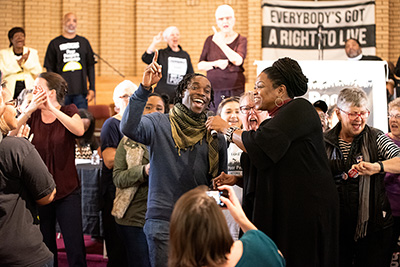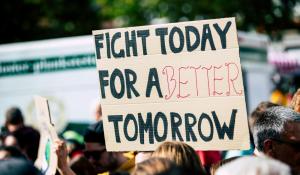
How we spend our money is a way of making our values clear and measurable. When retail corporations use robust revenues to open new store locations, we know those companies want to increase sales. When city councils vote on budgets, residents get to see what programs are being prioritized in their communities. Taking a quick review of our own shopping habits can reveal the practices, products, and services we prize most.
The government can vote with its dollars, too. In an era of interrelated crises, from climate, to COVID-19, to unchecked racial injustice, government spending is in the spotlight for its role in enabling destructive practices as well as for its transformative potential. Today, frontline organizations are fighting for the right to use public funds for the public interest and reimagine a safer, more prosperous world. These include efforts to ensure the wealthy pay their fair share in taxes, dramatically reduce military spending, and re-imagining policing—all strategies that would create change on the local and national levels.
No Taxation Without Taxing the Rich
In 2019, investing tycoon Warren Buffett confirmed that he’s still paying a lower tax rate than his secretary following an enlightening staff survey he conducted years prior. Over time, other affluent and influential business leaders like Bill Gates, founder of Microsoft, and Marc Benioff, the CEO of Salesforce, have advocated for an increased tax rate on the rich, supporting the call from nonprofit organizations, think tanks, and politicians for tax reform that not only holds corporations accountable, but wealthy individuals too.
When it comes to our current tax system, multiple truths exist. Tax breaks from charity donations, capital gains from stock and bond sales, and estate deductions which doubled under the 2017 Tax Cuts and Jobs Act, all enable the richest Americans to pay the least.
“When Americans found out that Donald Trump only paid $750 in taxes in 2017 they were shocked. But, this revelation points to a much larger problem, the tax code and its many loopholes favors the rich,” says Todd Larsen, executive co-director at Green America. “We need a tax code that prioritizes low- and moderate- income households in the US, to help the families who are struggling to make ends meet.”
Tax breaks for the wealthy prevent the federal government from collecting sufficient revenues. Currently, US tax revenue represents just 24 percent of the country’s gross domestic product (GDP), which is significantly lower than the 34 percent share of other wealthy countries in the Organization for Economic Cooperation Development (OECD) like Canada, France, Germany, and Sweden. Sweden holds the spot for the highest tax rates with its highest income earners paying a 57 percent rate in 2019, according to the World Economic Forum. Denmark, Finland, Iceland, Japan, Austria, and The Netherlands all have rates over 50 percent. Not coincidentally, these are also countries known for strong government services and social safety nets.
Increasing the tax rate by just one percentage point on the top two tax brackets would raise $125 billion over 10 years, according to the Congressional Budget Office. Raising taxes by 10 percentage points for the those who make $510,000 or more would generate roughly $3 trillion over 10 years, according to a 2019 study by The Guardian. This $3 trillion is about the same amount as adopting a 2 percent wealth tax would raise, a policy advocated for by progressives like Senator Elizabeth Warren (D-MA). The same Guardian study estimates that if that happened, the US could afford to make tuition at public universities free and triple the budget for the National Institute for Health (NIH), the latter of which would be particularly beneficial as the nation still grapples with COVID-19.
Budgeting For A “Peace Economy”
Imagining how the wealth of the American economy can be shared among the people is something activists have been working on for a long time. Five years after the March on Washington for Jobs and Freedom and his indelible “I Have A Dream” speech, Rev. Dr. Martin Luther King Jr. envisioned a campaign that would unite Americans of all races and cultural backgrounds facing the bitter circumstance of poverty. Dr. King’s fateful 1968 visit to striking sanitation workers in Memphis marked one of the first actions in what was dubbed The Poor People’s Campaign (PPC).

Over 50 years later, the PPC has been revived in the The Poor People’s Campaign: A National Call for Moral Revival, working to create what Dr. King called the Beloved Community, where “all people can share in the wealth of the earth and where poverty, hunger, and homelessness would not be tolerated because of international standards of human decency,” according to the King Center. The organization calls for funds to be redirected from the Department of Defense (DOD) to community-centered initiatives like health care access, housing, and education, raising the minimum wage, and enacting a federal jobs program.
Today, the DOD budget is $732 billion which is more than the military budgets of the next 10 countries combined. The PPC says that proper investment in public welfare is a necessary step to transition from a war economy to a peace economy.
“Our current economy uses violence, whether it’s through war, policing, incarceration, immigration enforcement, or detention to solve social problems, and poverty itself is violence,” says Shailly Gupta Barnes, the PPC policy director. “The creation of systems and weapons of violence not only impacts us here but also abroad. We’ve been in constant war for the past 20 years.”
A counter-argument that PPC organizers often hear in favor of military spending is that the military is a good jobs-creation program, but that doesn’t tell the whole story as thousands of veterans are struggling against poverty and food insecurity, especially amid COVID-19. In 2018, seven to 18 percent of military households sought food assistance, according to the nonprofit Blue Star Families.
In April 2018, the PPC published the Souls of Poor Folk, a report that analyzed how systemic racism, poverty, ecological destruction, and militarism has progressed over the last 50 years, and yielded compelling research. Medical debt is the number one cause of personal bankruptcy with the bottom 90 percent of Americans holding more than 70 percent of debt in the country, according to the report, highlighting how so many Americans are only one emergency away from financial ruin. Gupta Barnes notes environmental health risks Americans are living with as well.
“When looking at the number of Superfund sites across the country and the military installations around them, we can see the relationship between militarism and the devastation of our environment and of course, that’s affecting poor communities, especially poor communities of color, first,” Gupta Barnes says. "This campaign is about assessing how organizing across these inter-related issues can bring unity among those most impacted by them and fundamentally change our national priorities."
If the PPC's demands are met, the US would have $350 billion in military spending cuts which could possibly be reinvested in the Departments of Education, Health, and Justice, and the Veterans Affairs.
Reimagining Policing
Across the country, budgeting for peace and communal care is happening at the local level too in cities working to put an end to police violence and reimagine safety.
Over the summer of 2020, “Defund the Police” became a rallying call in the aftermath of police-involved killings. Contrary to what the phrase may suggest to some, many BLM activists are not intent on rendering police departments bankrupt. The organization’s call to defund the police means reallocating funds from bloated police department budgets to community investing initiatives like housing, education, mental healthcare, and social services.
Police departments typically receive between 20 to 45 percent of discretionary funds in municipal budgets, according to the Center for Popular Democracy. In June 2020, Black Lives Matter DC made a national statement when they painted the words “Defund the Police” on 16th Street in Washington, DC, now dubbed “Black Lives Matter Plaza,” a popular gathering place in front of the White House. A month later, DC’s city council approved a city budget that included a $15 million cut to the Metropolitan Police Department (MPD).
Now, Defund MPD, a coalition of local racial justice organizations is calling on DC schools to end contracts with MPD. At $23 million allocated annually, MPD’s largest contract is with DC Public Schools. The Black Swan Academy is a nonprofit student advocacy organization in the Defund MPD coalition that is demanding the implementation of violence interruption programs in place of a police presence and transformative justice instead of the criminalization of Black youth.
“Unlike policing, violence-interruption strategies are preventative. They’re oriented around authentic relationship building within the community and they’re trauma-informed. It comes from a lens that says our neighbors are not inherently bad, criminal or violent,” says Samantha Davis, founder of the Black Swan Academy.
With the money saved by ending their contracts with MPD, Defund MPD is demanding that DC public schools invest at least $10 million in mental health and violence interruption programs, and “send counselors, not cops,” as the Black Lives Matter at School campaign says.
“One of the most important things there is to understand about this movement is that police in our schools react to one or two things: trauma responses from young people, or healthy adolescent behavior,” Davis says.
What Can You Do?
Washington is too often in a stalemate, but local government is nimbler and more responsive to the people’s voice. Take these next steps and get involved in divestment/reinvestment efforts:
Provide public comments at city council meetings concerning local budgets and tell your city council officials to pass resolutions that divest from industries and practices that spur the climate crisis, mass incarceration, or the military industrial complex.
Support small businesses: Instead of shopping at big corporations that do not pay taxes, support small businesses with green values. Find them at Greenpages.org.
Join and amplify organizations you believe in: Join local or national chapter organizations leading divestment/reinvestment campaigns and share their actions with your community.







